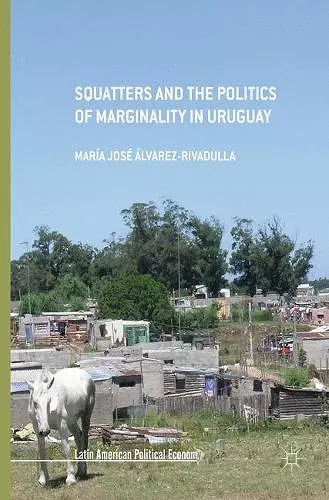Squatters and the Politics of Marginality in Uruguay
María José Álvarez-Rivadulla author
Format:Hardback
Publisher:Springer International Publishing AG
Published:5th Jul '17
Currently unavailable, and unfortunately no date known when it will be back

"Deftly combining historical analysis with quantitative and ethnographic research, and digging deep into the dynamics of land squatting, this book sheds much needed light into the heterogeneity, complexity, and tenacity of popular politics in Latin America. A must read for students of urban poverty, inequality, and mobilization." (Javier Auyero, Joe R. and Teresa Lozano Long Professor in Latin American Sociology, University of Texas at Austin, USA) "The book develops a perspective on squatters and politics that is sorely needed: a nuanced, interdisciplinary approach that reveals both the heterogeneity of urban poverty and the complexity of the politics surrounding squatter settlements. While Alvarez-Rivadulla has provided an empathetic view of squatters and their anguished circumstances, she has simultaneously produced an analytically and methodologically rigorous study. She skillfully illuminates the specific case of squatters in Uruguay while also developing why this particular case can be of interest to scholars working elsewhere in Latin America and beyond." (Edward Murphy, Associate Professor, Department of History and Global Urban Studies, Michigan State University, USA) "This book combines different issues that are very important to understand the relationship between key traits of contemporary Latin American politics and society (i.e. informality in the labor market, the politics of informality, collective action of the poor, clientelism, and squatting, among others). Studies with such a broad scope in terms of time covered and in-depth analysis of various units of observation is not common at all in the literature of the field." (Rafael Pineiro, Assistant Professor, Department of Political and Social Sciences, Universidad Catolica del Uruguay) "Squatters and the Politics of Marginality exposes overlooked patterns of social mobilization among the excluded in Uruguay. Combining impressive quantitative historical analysis with ethnographic work, readers are left with a complete picture of how squatting has changed both in frequency and form over time. The lesson that competitive democracies-and even those as capable as Uruguay-often tolerate land invasions and establish clientelistic relations with the marginalized shines brilliantly through." (Alisha Holland, Assistant Professor, Department of Politics, Princeton University, USA)
This book unveils the political economy of land squatting in a third world city, Montevideo, in Uruguay. From a social movements/contentious politics perspective, the book challenges the assumption that socioeconomic factors such as poverty were the only causes triggering land squatting.This book unveils the political economy of land squatting in a third world city, Montevideo, in Uruguay. It focuses on the effects of democratization on the mobilization of the poorest as well as on the role played by different types of brokers, from radical Catholic priests to local leaders embedded in political networks. Through a multi-method endeavour that combines ethnography, historical sources, and quantitative time series, the author reconstructs the history of the informal city since the late 1940s to the present. From a social movements/contentious politics perspective, the book challenges the assumption that socioeconomic factors such as poverty were the only causes triggering land squatting.
“Using color-coded maps and figures, Álvarez demonstrates patterns associating the timing, location, type of settlement, and brokerage. … The book’s structure, with the methodological discussion and the quantitative analysis in appendixes, makes it a good fit for both undergraduate and graduate syllabi. The historical sweep and ethnographic approach make it a good read, with interesting details, such as the reason Uruguayans have a unique and sarcastic word for shantytowns: cantegriles.” (Benjamin Goldfrank, Latin American Politics and Society, Vol. 60 (03), August, 2018)
ISBN: 9783319545332
Dimensions: unknown
Weight: 4149g
224 pages
1st ed. 2017